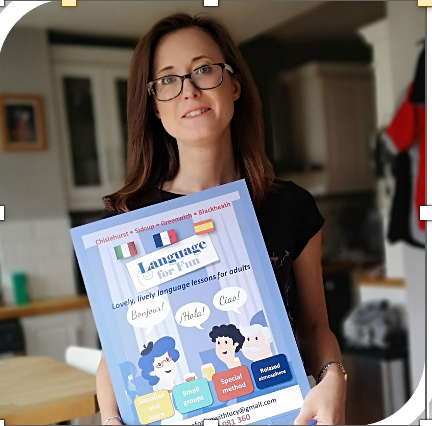LFF Executive Manager Lucy Martin shares her top memory tips for language learners
I became fluent in Spanish while living in Spain in my twenties. These days I’m learning conversational Chinese and Italian, and Ancient Greek for academic purposes, and aside from the more obvious signs of aging, a dead giveaway that I’m not in my twenties any more is that I just can’t remember new vocabulary like I used to!
This can be demoralising for older learners, and often feels like a barrier to progress, but don’t worry because there are all sorts of techniques that you can use to remember words or grammar rules. Here are three of the most effective ways to remember new language:

1- Tell a story
I was trying to learn some verbs for talking about my daily routine in Chinese. Unable to rely on cognates (words that sound similar to English), I spent days failing to memorise the phrase for “working out”, as it just felt like random sounds with nothing to relate them to: “dwan lien”.
In desperation, I made up a little play in my head about two imaginary people, Duane and Leanne, who go to the gym on a date and lift some weights together. Now, if you ask me how to say “working out” in Chinese, I tell myself my story about Duane and Leanne and the word immediately springs to mind.
2 – Visualise

There’s a letter in the Greek alphabet that doesn’t exist in English. It’s “ψ”, pronounced “psee”. Having failed repeatedly to remember how to read it, I realised it looks like a man with his arms in the air. Now, I picture King David, who wrote the Hebrew psalms (see what I did there?) with his hands in the air (maybe reciting a psalm) and I get it right every time.
3- Say it to someone
Once a word jumps off the page and into a real life situation, you’ll probably remember it for ever. You’ll probably even remember the moment you learned it. The moment I learned the word “sticky” in Spanish is etched in my brain as inextricably related to an encounter in a Madrid stationery shop on a hot afternoon in 1998 as I attempted to describe blutac to a longsuffering shopkeeper.
Having faith in this technique when visiting Italy this year, I was determined to find some Italian people to talk to, knowing that one of the best ways to get words to stick is to use them in a real life moment.
Fortified with limoncello for dutch courage, I managed a lovely chat with an Italian lady about the weather on the Amalfi coast. My sense of achievement of saying a few recently acquired sentences was enough to establish the experience in my brain as an important memory and now, remembering my new friend in the bar that evening is enough to trigger the Italian I practised with her.
So if you’re worried about coming back to French, Spanish or Italian this September because you find it hard to remember things, be encouraged that there are things that you can do to make it better – you might even surprise yourself with your powers of memorisation.